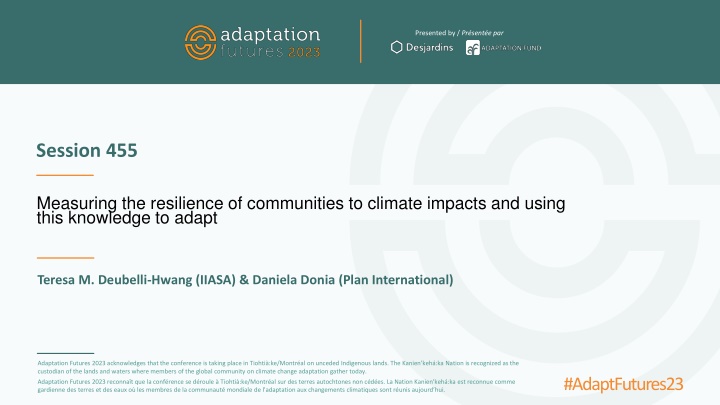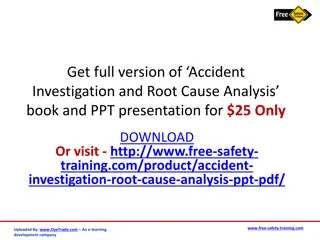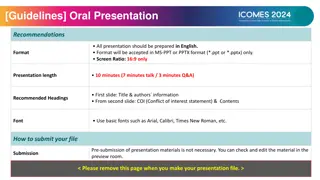
Resilience Measurement and Adaptation Strategies for Climate-Impacted Communities
Explore tools and projects presented at Adaptation Futures 2023 focusing on measuring community resilience to climate impacts, inclusive flood resilience, and youth-centered urban disaster risk reduction in Manila and Navotas, Philippines. Learn how these initiatives are enhancing community resilience, developing expertise, and promoting inclusive strategies for climate adaptation.
Download Presentation

Please find below an Image/Link to download the presentation.
The content on the website is provided AS IS for your information and personal use only. It may not be sold, licensed, or shared on other websites without obtaining consent from the author. If you encounter any issues during the download, it is possible that the publisher has removed the file from their server.
You are allowed to download the files provided on this website for personal or commercial use, subject to the condition that they are used lawfully. All files are the property of their respective owners.
The content on the website is provided AS IS for your information and personal use only. It may not be sold, licensed, or shared on other websites without obtaining consent from the author.
E N D
Presentation Transcript
Presented by / Prsente par Session 455 Measuring the resilience of communities to climate impacts and using this knowledge to adapt Teresa M. Deubelli-Hwang (IIASA) & Daniela Donia (Plan International) Adaptation Futures 2023 acknowledges that the conference is taking place in Tiohti :ke/Montr al on unceded Indigenous lands. The Kanien keh :ka Nation is recognized as the custodian of the lands and waters where members of the global community on climate change adaptation gather today. #AdaptFutures23 Adaptation Futures 2023 reconna t que la conf rence se d roule Tiohti :ke/Montr al sur des terres autochtones non c d es. La Nation Kanien'keh :ka est reconnue comme gardienne des terres et des eaux o les membres de la communaut mondiale de l'adaptation aux changements climatiques sont r unis aujourd hui.
a unique, non-governmental partnership supporting communities in strengthening their resilience to flood risk The FRMC Basics Introduction Roles and Responsibilities Advance & share knowledge Design strategies Develop expertise Our vision: floods have no negative impact on peoples ability to thrive 2 #AdaptFutures23
Flood Resilience Measurement for Communities (FRMC) Tool #AdaptFutures23
Why does inclusion matter for resilience? Developing gender and inclusion specific local questions for the FRMC #AdaptFutures23
Presented by / Prsente par Our project: Inclusive Flood Resilience Measurement for Communities (FMRC): Insights from Manila and Navotas (Philippines) Adaptation Futures 2023 acknowledges that the conference is taking place in Tiohti :ke/Montr al on unceded Indigenous lands. The Kanien keh :ka Nation is recognized as the custodian of the lands and waters where members of the global community on climate change adaptation gather today. #AdaptFutures23 Adaptation Futures 2023 reconna t que la conf rence se d roule Tiohti :ke/Montr al sur des terres autochtones non c d es. La Nation Kanien'keh :ka est reconnue comme gardienne des terres et des eaux o les membres de la communaut mondiale de l'adaptation aux changements climatiques sont r unis aujourd hui.
The project: Flood resilience in Manila and Navotas (Philippines) Project duration: July 2021 to December 2024 Implemented in seven barangays in two cities, Manila and Navotas Both cities are exposed to sea level rise and coastal flooding Focus on youth-centered urban disaster risk reduction Key intervention areas: 1. Capacity building in climate-smart, risk-informed planning at government and community level: This includes improving understanding of technical details for governing bodies and creating inclusive and age-appropriate learning materials for communities. 2. Livelihood support and protection to prevent people from becoming more vulnerable. #AdaptFutures23
Developing gender and inclusion specific local questions for the FRMC SAD disaggregated baseline data can help us understand the pre-existing socio- economic situation, assets and capacities that underpin resilience. 12 inclusive local questions were piloted in the 7 barangays across two cities, Manila and Navotas. Six used household survey as the data collection method and six used focus groups and key informants. In Manila a total of 360 household surveys were completed and in Navotas 520 household surveys were completed. #AdaptFutures23
Overview of Local Questions 1. Inclusion of indigenous and local knowledge in disaster decision-making 2. Children and youth flood response knowledge 3. Resilience education capacity 4. Resilience education for children and youth 5. Early warning 6. Access and control of savings 7. Youth employment opportunities 8. Climate change action 9. Intra-community equity 10.Community safety 11.Family violence 12.Support for parents/guardians of young children #AdaptFutures23
Objectives of the Gender & Inclusion Local Questions Pilot Project Strengthen the analysis of community flood resilience by ensuring that the FRMC process and outcomes are gender and children and youth (CAY) inclusive. Contribute to our ongoing endeavour of understanding urban gender and age dynamics. To test whether the local inclusive indicators may support the development of gender and CAY transformative flood resilience interventions. Positively impact on the lives of women and CAY in flood-prone communities using the FRMC. Learn from and refine the pilot local questions and feedback into FRMC/CRMC recommendations for gender and CAY inclusive sources. #AdaptFutures23
Analysis overview Theme 1: Equity, safety, and access to finances Indicate underlying factors that impact on the distribution of opportunities and risks for groups in normal times and in times of disaster Less tangible, perception-based aspects of the system Theme 2: Climate and disaster resilience capacity. Inclusiveness of the early warning system and capacity to act Disaster risk reduction capacity and awareness #AdaptFutures23
Equity, safety, and access to finances: findings Relatively consistent views on equity between age and gender groups. One notable difference is that men are more likely to strongly agree that people get paid fairly. High level of concern about safety, especially within groups of people with diverse gender identities and those in older age groups. Men have more access to control over savings. This signals that broadly targeted strategies for flood preparedness and response may not address the specific concerns, needs and support of different groups. Including provision for prevention for gender- based violence. Further investigation in relation to safety and crime both in normal times, and in relation to flooding, would be an important area of interest for resilience building in these barangays. #AdaptFutures23
Climate and disaster resilience capacity: findings Vulnerable people may be inhibited from taking protective actions due to several factors, including the lack of inclusivity provisions in early warning systems (EWS) and evacuation centres. Risk of family violence is not sufficiently accounted for in DRR plans or training of disaster response personnel. This disproportionally puts women and children at risk in a disaster. A priority area for disaster resilience is to ensure that resources, training, and opportunities are made relevant, available, and actionable to young people and other community members. Key area of opportunity for more inclusive and child friendly EWS through consultation with different groups. Further SAD and socio-economic analysis could be undertaken in these barangays to identify the factors that enable or hinder actions in different types of households to take protective actions. #AdaptFutures23
Key take aways Promoting financial empowerment of women shows promising prospects for reducing vulnerabilities and increase resilience. Enhancing livelihood opportunities and financial resilience holds potential for reducing interconnected vulnerabilities of marginalized groups. Promoting contextualized education on climate and disaster risks offers opportunities to empower Manila s youth to act risk informed. Enhancing the inclusiveness and accessibility of Early Warning Systems increases their effectiveness. Integrating provisions for preventing violence and strengthening socio-economic cohesion in flood-prone areas to enable more effective flood evacuation strategies. #AdaptFutures23
Translating the take aways into action: Insights from the project The results provided guidance for more gender responsive and inclusive intervention design in the project Youth engagement (disaster preparedness trainings, youth councils, child friendly spaces) Child-centered community based DRR and management trainings Inclusive EWS Community planning Community savings groups Provided insights into interventions that need more support or should be advocated for more child protection and gender-based violence Inform interventions of future phases #AdaptFutures23
Thank you! Teresa M. Deubelli-Hwang (IIASA) & Daniela Donia (Plan International) deubelli@iiasa.ac.at & ddonia@plancanada.ca #AdaptFutures23





















